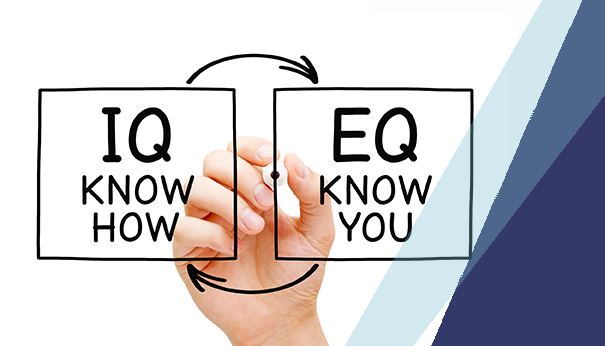 When you think about being emotionally intelligent, what comes to mind?
When you think about being emotionally intelligent, what comes to mind?
If you are like most of us, your first though is about other people, how you treat your colleagues and the people on your team. Things like being a good listener, showing empathy and managing difficult conversations likely come to mind, and you likely imagine that this is the tough part , the place where you need to put in the time and energy to get it right. Right?
However, research suggests that a crucial and often-neglected aspect of EI for most of us is actually self-awareness: as psychologist Laura Murray puts it “we can effectively work with others only if we get really good at knowing ourselves, our thoughts, our emotional reactions, and our tendencies.”
You also cannot be present for others in any useful way if you are depleted, exhausted, stressed or miserable yourself. You know this: just consider how well you can truly listen to someone with a complex challenge when you are distracted by other pressing problems, or even something as seemingly trivial as physical discomfort or hunger.
So, what do you do every day if you want to show up with emotional intelligence? Here are a few suggestions:
- Notice what you are thinking and feeling. Self-awareness can mean taking as little as 60 seconds, once or twice a day, to put pen to paper and download the thoughts and emotions that are swirling around in your head. It isn’t necessary to analyze them deeply or resolve anything—just noting their existence can raise your self-awareness and reveal patterns. Furthermore, labeling feelings such as fear or anger is a proven technique to defuse them. Being aware of where you’re at helps you stay in control of your emotional reactions and avoid “taking it out” on others too.
- Make time for self-care. We are physical as well as mental beings and it is impossible to sustain high levels of insightful, energetic, emotionally-intelligent work without a decent quality and quantity of sleep, exercise, nutrition, sunlight and so on. The science clearly supports the importance of looking after the basics and even suggests that spending some time around trees and grass can literally lower stress levels and lead to clearer cognition and better self-control. Stop making workaholism and extreme stress a badge of honour and get some rest already!
- Enjoy yourself! This is how the cycle goes: you are in a good place with high engagement and enthusiasm. Complications occur, and you roll with the punches. You respond to problems with wisdom and tranquility, you listen compassionately to others’ distress, you look for productive ways to move forward. Over time, though, you run low on patience and energy and become stressed, irritated, and eventually exhausted. You drop into a funk and become weary and depressed. To get back to the high point of the cycle, you need fuel, and that fuel comes from happiness, pleasure, and enjoyment. The fuller your “fuel tank”, the more challenge and adversity you can handle—so, do something you love every day to make sure you are always ready to face whatever every day brings.



